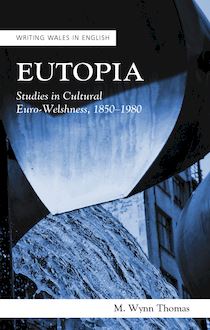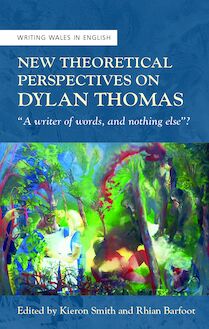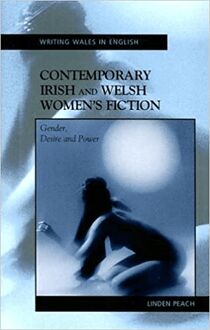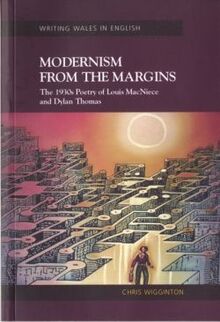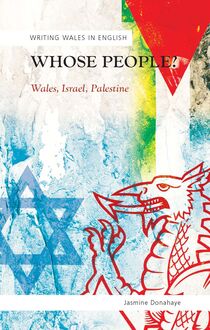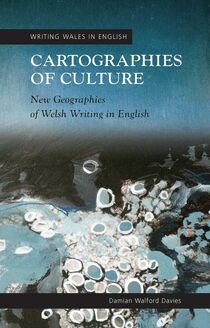Pacifism, Peace and Modern Welsh Writing , livre ebook
109
pages
English
Ebooks
2019
Vous pourrez modifier la taille du texte de cet ouvrage
Obtenez un accès à la bibliothèque pour le consulter en ligne En savoir plus
Découvre YouScribe en t'inscrivant gratuitement
Découvre YouScribe en t'inscrivant gratuitement
109
pages
English
Ebooks
2019
Vous pourrez modifier la taille du texte de cet ouvrage
Obtenez un accès à la bibliothèque pour le consulter en ligne En savoir plus
Publié par
Date de parution
01 mai 2019
Nombre de lectures
3
EAN13
9781786834058
Langue
English
Poids de l'ouvrage
2 Mo
This book introduces the contribution of modern Welsh literature to our understanding of peace and pacifism – an important and much overlooked subject in Welsh studies. Taking a literary-historical approach to the subject, it reveals how modern Welsh writing opens up history in ways in which historical discourse alone sometimes fails to do. It argues that the concepts of peace, peacefulness and pacifism have played a broader and more complex role in Welsh life than has been recognised, primarily through an influential Welsh-language pacifist intelligentsia. The author reminds us that Welsh pacifism is distinguished from English pacifism by the Welsh language itself, its links with Welsh nationalism and by the fact that it faced challenges and pressures never encountered by English pacifism. Authors discussed in this study include Tony Curtis, George M. Ll. Davies, Pennar Davies, John Eilian, Emyr Humphreys, Glyn Jones, D. Gwenallt Jones, T. Gwynn Jones, T. E. Nicholas, Iorwerth C. Peate, Angharad Price, Ned Thomas, Lily Tobas and Waldo Williams.
Series Editors’ Preface
Preface
Acknowledgements
Pacifism and Protest:
Mapping Welsh Pacifism
The Bible and the Prison
Peace and Peacefulness:
The Spirit of Pacifism: Waldo Williams and D. Gwenallt Jones
Unpeaceful Voices: Writing the Home Fronts
Conflicting Worlds
Post-Pacifism: Peace and War
A Welsh Pacifist Translation of an English Classic an Afterword
Notes
Select Bibliography
Index
Publié par
Date de parution
01 mai 2019
Nombre de lectures
3
EAN13
9781786834058
Langue
English
Poids de l'ouvrage
2 Mo
Pacifism, Peace and Modern Welsh Writing
WRITING WALES IN ENGLISH
CREW series of Critical and Scholarly Studies
General Editors: Kirsti Bohata and Daniel G. Williams ( CREW , Swansea University)
This CREW series is dedicated to Emyr Humphreys, a major figure in the literary culture of modern Wales, a founding patron of the Centre for Research into the English Literature and Language of Wales . Grateful thanks are due to the late Richard Dynevor for making this series possible.
Other titles in the series
Stephen Knight, A Hundred Years of Fiction (978-0-7083-1846-1)
Barbara Prys-Williams, Twentieth-Century Autobiography (978-0-7083-1891-1)
Kirsti Bohata, Postcolonialism Revisited (978-0-7083-1892-8)
Chris Wigginton, Modernism from the Margins (978-0-7083-1927-7)
Linden Peach, Contemporary Irish and Welsh Women s Fiction (978-0-7083-1998-7)
Sarah Prescott, Eighteenth-Century Writing from Wales: Bards and Britons (978-0-7083-2053-2)
Hywel Dix, After Raymond Williams: Cultural Materialism and the Break-Up of Britain (978-0-7083-2153-9)
Matthew Jarvis, Welsh Environments in Contemporary Welsh Poetry (978-0-7083-2152-2)
Harri Garrod Roberts, Embodying Identity: Representations of the Body in Welsh Literature (978-0-7083-2169-0)
Diane Green, Emyr Humphreys: A Postcolonial Novelist (978-0-7083-2217-8)
M. Wynn Thomas, In the Shadow of the Pulpit: Literature and Nonconformist Wales (978-0-7083-2225-3)
Linden Peach, The Fiction of Emyr Humphreys: Contemporary Critical Perspectives (978-0-7083-2216-1)
Daniel Westover, R. S. Thomas: A Stylistic Biography (978-0-7083-2413-4)
Jasmine Donahaye, Whose People? Wales, Israel, Palestine (978-0-7083-2483-7)
Judy Kendall, Edward Thomas: The Origins of His Poetry (978-0-7083-2403-5)
Damian Walford Davies, Cartographies of Culture: New Geographies of Welsh Writing in English (978-0-7083-2476-9)
Daniel G. Williams, Black Skin, Blue Books: African Americans and Wales 1845-1945 (978-0-7083-1987-1)
Andrew Webb, Edward Thomas and World Literary Studies: Wales, Anglocentrism and English Literature (978-0-7083-2622-0)
Alyce von Rothkirch, J. O. Francis, realist drama and ethics: Culture, place and nation (978-1-7831-6070-9)
Rhian Barfoot, Liberating Dylan Thomas: Rescuing a Poet from Psycho-Sexual Servitude (978-1-7831-6184-3)
Daniel G. Williams, Wales Unchained: Literature, Politics and Identity in the American Century (978-1-7831-6212-3)
M. Wynn Thomas, The Nations of Wales 1890-1914 (978-1-78316-837-8)
Richard McLauchlan, Saturday s Silence: R. S. Thomas and Paschal Reading (978-1-7831-6920-7)
Bethan M. Jenkins, Between Wales and England: Anglophone Welsh Writing of the Eighteenth Century (978-1-7868-3029-6)
M. Wynn Thomas, All that is Wales: The Collected Essays of M. Wynn Thomas (978-1-7868-3088-3)
Laura Wainwright, New Territories in Modernism: Anglophone Welsh Writing , 1930-1949 (978-1-7868-3217-7)
Siriol McAvoy, Locating Lynette Roberts: Always Observant and Slightly Obscure (978-1-7868-3382-2)
Pacifism, Peace and Modern Welsh Writing
WRITING WALES IN ENGLISH
LINDEN PEACH -->
UNIVERSITY OF WALES PRESS 2019
© Linden Peach, 2019
All rights reserved. No part of this book may be reproduced in any material form (including photocopying or storing it in any medium by electronic means and whether or not transiently or incidentally to some other use of this publication) without the written permission of the copyright owner. Applications for the copyright owner s written permission to reproduce any part of this publication should be addressed to the University of Wales Press, University Registry, King Edward VII Avenue, Cardiff CF10 3NS.
www.uwp.co.uk
British Library CIP Data
A catalogue record for this book is available from the British Library.
ISBN: 978-1-78683-402-7 (hardback)
978-1-78683-403-4 (paperback)
e-ISBN: 978-1-78683-405-8
The right of Linden Peach to be identified as author of this work has been asserted in accordance with sections 77 and 79 of the Copyright, Designs and Patents Act 1988.
The University of Wales Press acknowledges the financial assistance of the Welsh Books Council in publication of this book.
The publisher has no responsibility for the persistence or accuracy of URLs for any external or third-party internet websites referred to in this book, and does not guarantee that any content on such websites is, or will remain, accurate or appropriate.
Cover image: Doves © Freepik. Montage Clifford Hayes.
Original peace (ND) symbol designed by Gerald Holtom (1958)..
i
Angela, Hedley, Matthew a Kate
ac er cof am fy mam, fy nhad a m chwaer Cynthia
Contents
Series Editors Preface
Preface
Acknowledgements
Pacifism and Protest
1 Mapping Welsh Pacifism
2 Disruptive Bibles
3 Prison(s)
Peace and Peacefulness
4 The Spirit of Pacifism: Waldo Williams and D. Gwenallt Jones
5 Unpeaceful Voices: Writing the Home Fronts
Conflicting Worlds
6 Post-Pacifism: Peace and War
7 A Welsh Pacifist Translation of an English Classic... an Afterword
Notes
Select Bibliography
Series Editors Preface
The aim of this series, since its founding in 2004 by Professor M. Wynn Thomas, is to publish scholarly and critical work by established specialists and younger scholars that reflects the richness and variety of the English-language literature of modern Wales. The studies published so far have amply demonstrated that concepts, models and discourses current in the best contemporary studies can illuminate aspects of Welsh culture, and have also foregrounded the potential of the Welsh example to draw attention to themes that are often neglected or marginalised in anglophone cultural studies. The series defines and explores that which distinguishes Wales s anglophone literature, challenges critics to develop methods and approaches adequate to the task of interpreting Welsh culture, and invites its readers to locate the process of writing Wales in English within comparative and transnational contexts.
Professor Kirsti Bohata and Professor Daniel G. Williams
Founding Editor: Professor M. Wynn Thomas (2004-15)
CREW ( Centre for Research into the English Literature and Language of Wales ) Swansea University
Preface
Pacifism is not passive. It is part of the radicalism of Wales associated with protest, rebellion and insurgency. The popular conviction that there is, or has been, a tradition of pacifism in Wales has been questioned by reputable Welsh historians, who have traced the way in which the peace organisations have waxed and waned in Wales over the nineteenth and twentieth centuries. But the part that pacifism has played in Welsh life is broader and more complex than the fortunes of the peace movement and is linked to an influential Welsh-language, pacifist intelligentsia.
While this study addresses the organisational history of peace movements in Wales, it is primarily concerned with how pacifism has contributed more widely to Welsh culture, and especially its literature. The part that pacifism has played, and still plays, in the political and cultural evolution of modern Wales is a subject which a literary-historical approach is well equipped to examine and this book breaks new ground in exploring pacifism through texts written in Welsh and English. If anything distinguishes Welsh and English pacifism, it is the Welsh language itself and how Welsh pacifism faces challenges and pressures which never confronted English pacifism. In combining, for the first time, an examination of the history of pacifism with pacifist writing, this study argues that Welsh pacifism and campaigns for peace - through Welsh-language periodicals, pamphlets and literary texts - were brought into existence by a Welsh, and primarily Welsh-language, intelligentsia which it did much, in turn, to constitute.
The texts discussed in this book have been published in English or have been published in translation. The latter is not unproblematic for many reasons, not least because Welsh-English translation is inevitably enmeshed in the wider vicissitudes of Welsh social and cultural politics. Inevitably, these come to the fore in the translation of Welsh pacifist writing into English because pacifists, who historically have been in the vanguard of campaigns in support of nationalism and the Welsh language, have often found themselves confronted by a seemingly impermeable anglicised cultural and political establishment. But in discussing Welsh texts in translation, this book has sought to concentrate on how translators have responded to the subtleties of meaning and the richness of the original Welsh, and have displayed sympathy with the pacifist intentions of the work and its breadth of understanding of pacifism. Beginning with the assumption that readers come to a creative work, whether in translation or in the original language, for the enjoyment of words, the emphasis throughout is on the way in which translators have engaged with particular structures, vocabularies and forms of expression.
It is not news that meaning is always the product of difference between words, but it is particularly important to a discussion of pacifism to keep in mind that the meaning of words is never stable and changes over time. Central to this book is how the concepts of pacifism , peace and war stand revealed differently in different works and acquire fresh significances in new contexts. In conflating literature and history, context inevitably assumes considerable significance and this study examines how literature opens up history in ways in which historical discourse alone sometimes fails to do, while always recognising that for many Welsh- and English-language writers context is often a site of anxiety.
This study argues that through a literary-historical approach, relying on the original Welsh or on translation, the philosophical depth, social realism, psychological momentum and even the doubt and despair involved in






